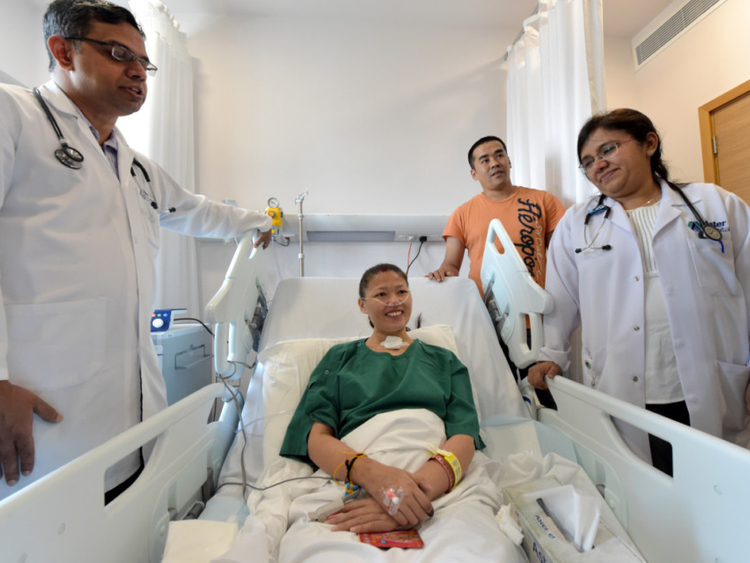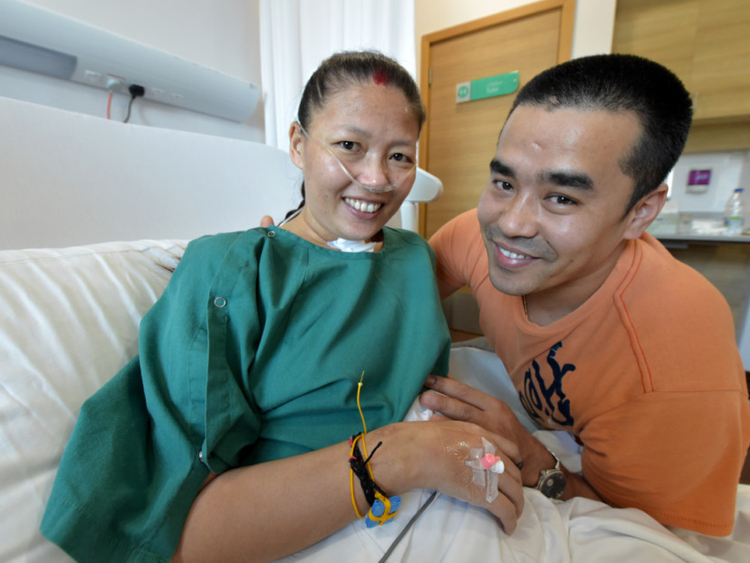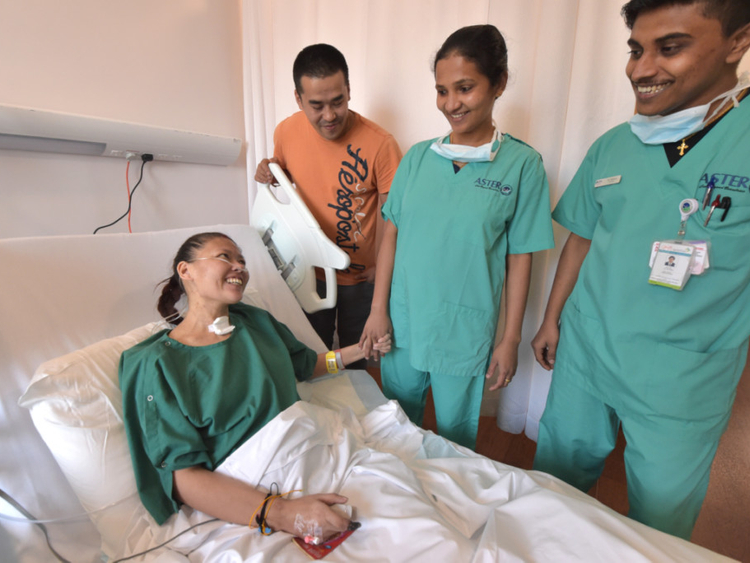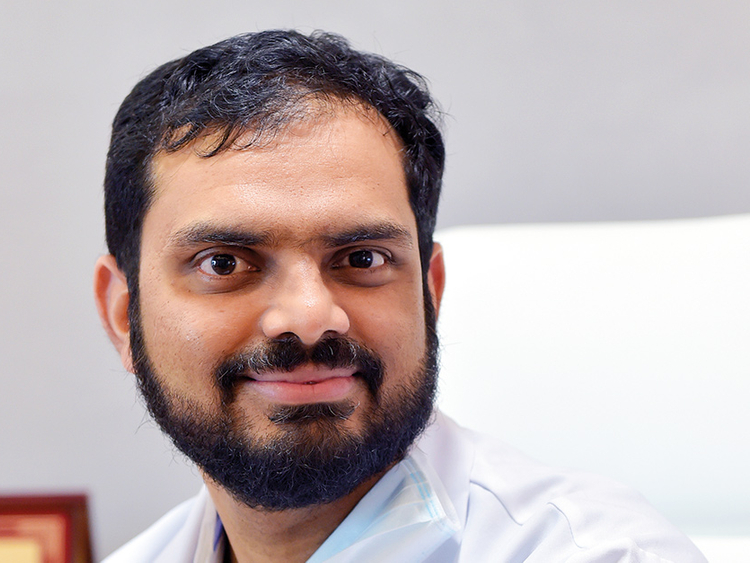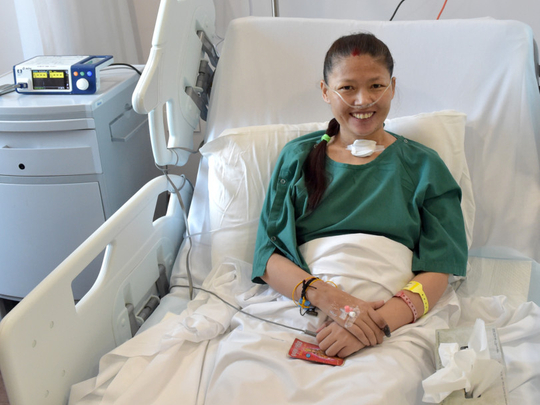
Dubai: A 31-year-old Nepalese expatriate who spent 80 days in semi-comatose condition during which she had emergency caesarean section surgery has woken up following a miraculous recovery, doctors said on Monday.
Devi Lama Shrestha, woke up early this month on April 9 and found her husband Lokendra Shrestha, 32, by her side at Aster Hospital in Mankhool, Dubai.
Dr Sherbaz Bichu, the hospital CEO said it was a miracle. “We took on the case as a challenge and at times were in doubt about her chances of survival. However, the unwavering love and dedication of her husband inspired us. He told us we had to save his wife, otherwise he would die along with her. He held a vigil by her bedside all along and helped us keep our determination strong and steady throughout.”
Devi and Lokendra fell in love while working together at a popular coffee shop chain and married last year in June. Little did they know that such a close brush with death awaited Devi who was six months into her pregnancy.
“My wife was pregnant with our first child and was six months and four days into her pregnancy when she suddenly fell ill at work on January 16. She had high fever and severe vomiting bouts so I brought her to the hospital. However, after three days of hospital stay, she got worse and suddenly collapsed and had to be admitted to the ICU,” Shrestha told Gulf News.
Specialist in Internal Medicine Dr Chaitanya Prabhu, who treated her, said: “The patient came to us with Acute Respiratory Distress Syndrome (ARDS) which is possible during pregnancy. Her lungs were inflamed with infection and filled with fluids. Apart from this primary complication she had a very poor heart function with irregular rhythm. Her kidneys and her liver were affected and with this the chances of her survival were highly compromised. We also diagnosed a mitral valve defect which she will have to get operated for later. With all these complications we had to induce her into coma to put her under intensive medication protocol and she had to have a tracheostomy and was put on a ventilator as she was not capable of breathing independently.”
Due to risk of multi-organ failure, ARDS, her heart condition and muscle weakness, Devi could not sustain the pregnancy and underwent an emergency Caesarean section.
Usually patients are put on assisted breathing devices like ventilators for a maximum of 14 days and gradually weaned off, but Devi remained on the ventilator for a little over three months.
“She had lot of muscle weakness and her diaphgram muscles could not carry out independent breathing,” said Dr Jyoti Upadhaya, an internal medicine specialist on the team. “Many a times we had doubts about her survival and we consulted our ICU teams in India to review if there was something we had got wrong. It was a touch-and-go situation but Devi was a determined patient, fighting for her life silently and the ICU team too puts its heart and soul in caring for her round the clock. Usually, patients are not put on ventilators for so long. They are weaned off after a few weeks.”
Devi who has revived since April 9 has been moved to a regular room and is undergoing active physiotherapy to regain strength so that she can recover her strength and move back to her village Kothung in Nepal.
She recalls nothing of the past 100 days except a recurrent dream that she was travelling in a train with people. “I could see a lot of Feng Shui signs along my journey and one woman whose face I cannot recall, took special care of me. Probably she was my guardian angel,” said Devi, grateful to be alive.
A graduate in English literature, Devi now plans to return to her village in Khotung Nepal and open a linguistic academy. “In my village children are not taught the proper pronunciation in English. I had earlier saved money and opened a boarding school in Kathmandu which had to be disposed off. Now I plan to open a school from kindergarten to high school where the right kind of education is imparted to the children of my village,” she said.
Dr Prabhu said it would take another six months of full rehabilitation that will include neuro and physical therapy along with the right kind of diet and nutrition to get the patient back on her feet after which Devi plans to open the first three sections of her dream school.
What is ARDS?
Acute Respiratory Distress Syndrome is a life-threatening lung disease characterised by inflammation of the lungs. It is marked by a fluid build-up in the tiny air sacs (aleveoli) in the lungs that prevents oxygen from reaching the blood stream and causes breathlessness in patients. The survival chances of patients with ARDS are very slim. Any kind of pulmonary distress carries high rate of maternal and foetal morbidity.


